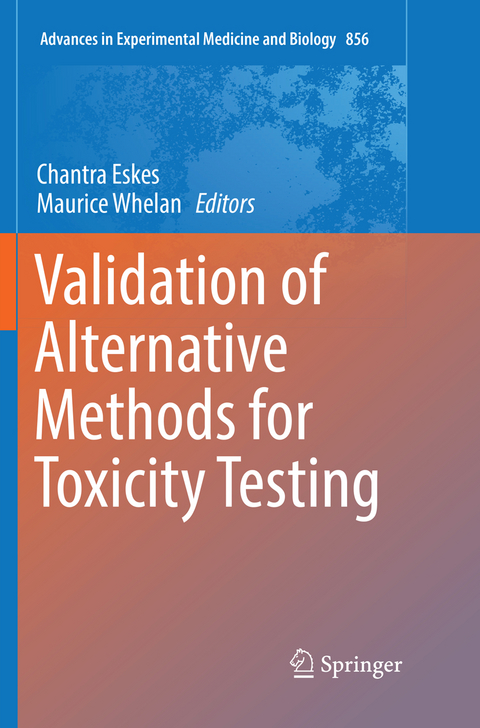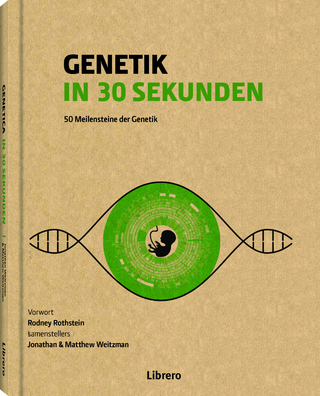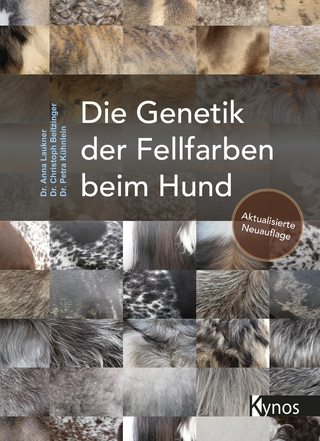
Validation of Alternative Methods for Toxicity Testing
Springer International Publishing (Verlag)
978-3-319-81612-8 (ISBN)
This book provides information on best practices and new thinking regarding the validation of alternative methods for toxicity testing. It covers the validation of experimental and computational methods and integrated approaches to testing and assessment. Validation strategies are discussed for methods employing the latest technologies such as tissue-on-a-chip systems, stem cells and transcriptomics, and for methods derived from pathway-based concepts in toxicology.
Validation of Alternative Methods for Toxicity Testing is divided into two sections, in the first, practical insights are given on the state-of-the-art and on approaches that have resulted in successfully validated and accepted alternative methods. The second section focuses on the evolution of validation principles and practice that are necessary to ensure fit-for-purpose validation that has the greatest impact on international regulatory acceptance of alternative methods. In this context validation needs to keep pace with the considerable scientific advancements being made in toxicology, the availability of sophisticated tools and techniques that can be applied in a variety of ways, and the increasing societal and regulatory demands for better safety assessment.
This book will be a useful resource for scientists in the field of toxicology, both from industry and academia, developing new test methods, strategies or techniques, as well as Governmental and regulatory authorities interested in understanding the principles and practicalities of validation of alternative methods for toxicity testing.
Chantra Eskes, PhD, Eng. With Engineering and MsC degrees in food sciences followed by a PhD in in vitro neurotoxicity, Dr. Eskes has over 20 years of experience in the development, optimization, validation, peer-review and regulatory acceptance of alternative methods to animal toxicity testing. Her activities have contributed to the formal validation and regulatory acceptance of several test methods and to the development of a number of official international test guidelines. Dr. Eskes is a Nominated Expert for the Organisation for Economic Co-operation and Development (OECD), the President of the European Society of In Vitro Toxicology (ESTIV), and the Executive Secretary of the Animal Cell Technology Industrial Platform on the production of biopharmaceuticals (ACTIP). She is the founder and manager of SeCAM, a company offering independent consultation and services regarding alternative methods for scientific, regulatory, and industrial requirements. She is also editor, author, and co-author of a number of scientific monographs, articles, and book chapters and acts as reviewer for several journals in the field of in vitro toxicology. Maurice Whelan Prof. Maurice Whelan is head of the Systems Toxicology Unit of the Institute for Health and Consumer Protection (IHCP) of the European Commission's Joint Research Centre (JRC), based in Ispra, Italy. He also leads the European Union Reference Laboratory for Alternatives to Animal Testing (EURL ECVAM) of the JRC, established under EU Directive 2010/63 on the protection of animals used for scientific purposes to build on the 20 years of activities of ECVAM, the European Centre for the Validation of Alternative Methods. His areas of expertise include the development, validation and promotion of alternative approaches to animal testing both for regulatory safety assessment of chemicals (inc. nanomaterials) and for applications in biomedical research. Whelan is the EU co-chair of the OECD Advisory Group on Molecular Screening and Toxicogenomics that is responsible for the OECD programme on Adverse Outcome Pathways, and he is a member of the Steering Committee of the European Partnership for Alternative Approaches to Animal Testing (EPAA). He also currently holds an external appointment of visiting Professor of Bioengineering at the University of Liverpool (UK).
Introduction.- Validation in support of internationally harmonised OECD Test Guidelines for assessing the safety of chemicals.- Regulatory acceptance of alternative methods in the development and approval of pharmaceuticals.- Validation of alternative in vitro methods to animal testing: concepts, challenges, processes and tools.- Practical aspects of designing and conducting validation studies involving multi-study trials.- Validation of computational methods.- Implementation of New Test Methods into Practical Testing.- Pathway Based Toxicology and Fit-for-Purpose Assays.- Evidence-based toxicology.- Validation of transcriptomics-based in vitro methods.- Ensuring the quality of stem cell-derived in vitro models for toxicity testing.- Validation of bioreactor and human-on-a-chip devices for chemical safety assessment.- Integrated approaches to testing and assessment.- International harmonization and cooperation in the validation of alternative methods.- Evolving the principlesand practice of validation for new alternative approaches to toxicity testing.
| Erscheinungsdatum | 05.03.2022 |
|---|---|
| Reihe/Serie | Advances in Experimental Medicine and Biology |
| Zusatzinfo | XX, 407 p. 44 illus., 40 illus. in color. |
| Verlagsort | Cham |
| Sprache | englisch |
| Maße | 155 x 235 mm |
| Gewicht | 6438 g |
| Themenwelt | Medizin / Pharmazie ► Pharmazie |
| Naturwissenschaften ► Biologie ► Genetik / Molekularbiologie | |
| Naturwissenschaften ► Chemie ► Technische Chemie | |
| Technik | |
| Schlagworte | computational methods • Human-on-a-chip • in vitro • Toxicity testing • Transcriptomics • Validation |
| ISBN-10 | 3-319-81612-8 / 3319816128 |
| ISBN-13 | 978-3-319-81612-8 / 9783319816128 |
| Zustand | Neuware |
| Informationen gemäß Produktsicherheitsverordnung (GPSR) | |
| Haben Sie eine Frage zum Produkt? |
aus dem Bereich


